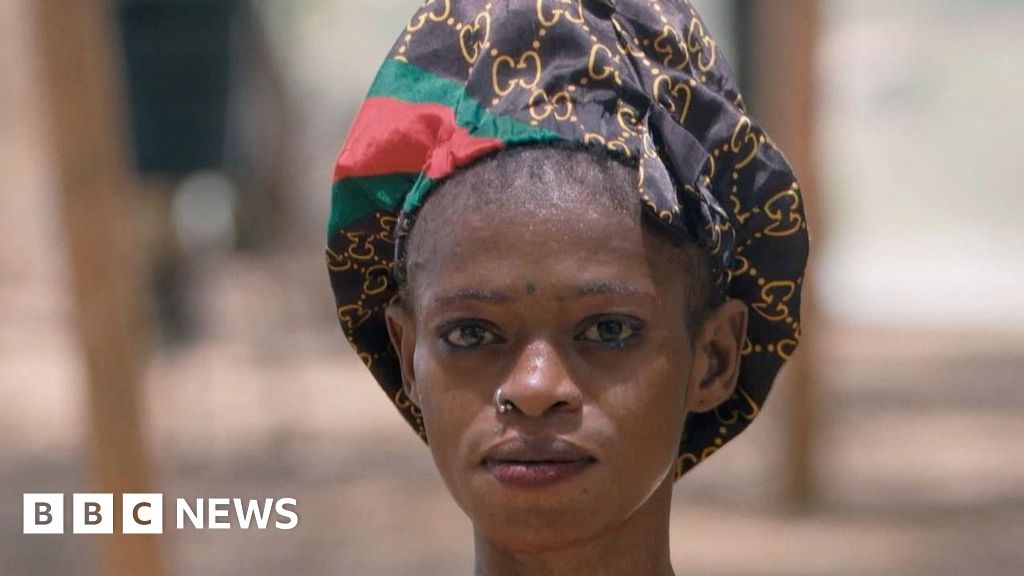
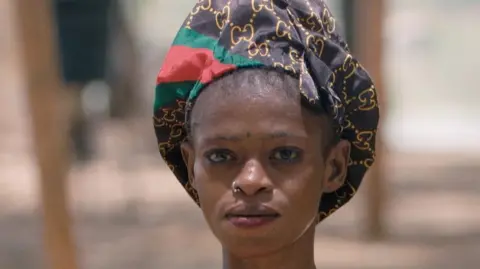 BBC
BBCIsata, a single mother in her early twenties, epitomises the horrors of the lives of sex workers in Sierra Leone.
She has been beaten, robbed, kidnapped, trafficked to another country, rescued, trafficked and rescued again.
Amidst all of this, she became hooked on a dangerous street drug, kush, that is wreaking havoc in the West African nation.
BBC Africa Eye spent four years following the lives of a group of sex workers in Makeni, about 200km (124 miles) from the capital Freetown.
The city lies in an area rich in diamonds, which fuelled Sierra Leone’s civil war – a conflict that has had devastating consequences still being felt to this day.
Isata is one of hundreds of sex workers in Makeni. Like all of the women we spoke to, she has opted to only use her first name.
“All the sacrifices I’m making, I do it for my daughter. I have been through so much pain on the streets,” she said.
“I met a man in the club. He tore my clothes. He took money from my bra. I was trying to fight my way out. He hit me on the back of the head with his gun. He wanted to kill me.”
It is a dangerous life – some of the women we meet have also contracted HIV.
Others have been killed.
But many feel there is little choice.
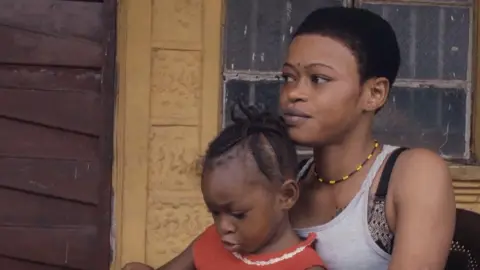
In a dark patch of swampland in the city, two sex workers pointed out an area with empty grain sacks spread out across the ground.
One of the young women, Mabinty, told us this was where they worked side by side – seeing up to 10 men a night.
The men pay them a dollar a time.
She is trying to make enough money to support her children. She had six, but three died.
The other three are in school.
“One child has just sat his exams. I don’t have money to pay for him to go to school, unless I sell sex. These are my sufferings,” she said.
Thousands of women are estimated to have turned to sex work across Sierra Leone.
Many of them are young women orphaned by the war, which claimed the lives of more than 50,000 people and displaced almost half the country’s population by the time it ended in 2002.
Charity groups say the number of young girls working in the sex trade has further increased as the country grapples with the economic fallout of the Ebola outbreak and the coronavirus pandemic.
Like many crises, these have disproportionately impacted women.
Prostitution is not illegal in the country, but the women are seen as outcasts and receive little support from the government or society.
Not long after we met Isata in 2020, she was kidnapped by a criminal gang and forced into sex slavery in The Gambia, Senegal and finally Mali.
She managed to get hold of a phone and described her life there.
“The way they approach us, it is like they want to kill us unless we accept,” she said.
“I am suffering so much.”
BBC Africa Eye was then able to track her down and a UN body, the International Organisation for Migration (IOM), helped Isata return to Sierra Leone.
She gave up sex work but, when we saw her in 2021, she was struggling to make enough money to take care of her daughter, by cooking in a local kitchen.
The next time we got an update on Isata, in 2023, she had returned to prostitution after becoming hooked on kush – a psychoactive blend of addictive substances sold cheaply, that can contain human bones.
The drug has become such a problem in Sierra Leone, the president has declared it a national emergency.
In the grip of addiction, Isata left behind her youngest child – a son just four months old.
He was being looked after by Isata’s mother, Poseh.
“The stress of the street life led her to smoking kush. It’s the stress,” Poseh said.
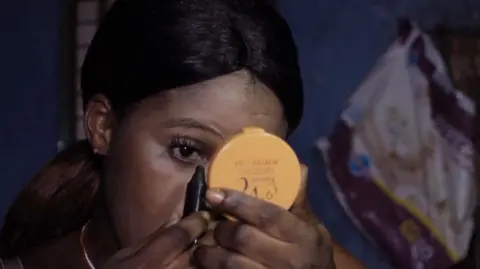
Nata is also a single mother in her twenties.
She has three daughters.
We met her at home, where she was getting ready to go out and work.
“I want my children to do well in life. I hope my prayers will be answered by God,” she said.
Her daughter watched her mum apply her make-up. She told us she wanted to become a lawyer when she is older.
“To help my mum,” she said.
Across town, we met another young girl, Rugiatu, aged around 10.
Her mother Gina was also a sex worker. She was murdered in 2020 at just 19 years old.
Rugiatu now lives with her elderly grandmother.
“My mum and dad are dead now. I am only left with my grandma. If my gran dies, all I can do is go and beg in the street,” Rugiatu said.
“I don’t want them to kill me on the street too.”
When we next saw Nata, she was unrecognisable. She, too, has become hooked on kush.
“I am not happy to be like this, but I don’t want to think much,” she tells us.
“Sometimes I cry when I remember. That why I am smoking, to forget.”
Her three daughters have had to go and live with relatives.
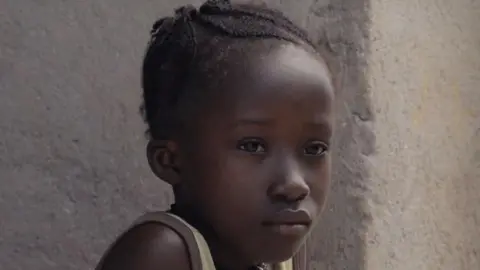
Then, in early 2024, there was more bad news from Isata.
She had been trafficked again, as part of a group of women who were promised nanny work in Ghana but were instead taken to Mali and forced to sell sex in a gold-mining area.
“I want to be taken home. I’m begging, I regret everything,” Isata tells us over the phone.
She said she became worried when the man who promised the nannying work dodged police checkpoints and border posts at every stage of the journey.
“He handed us over to a Nigerian woman called Joy,” she said.
“We asked: ‘You told us we are going to Ghana for nanny work, is this Ghana?’”
“Joy asked us: ‘Were we not told we are coming to do sex work?’ Then I said: ‘No’.”
“She said: ‘Go and get some money’ and give it her.”
Like many trafficked women, Isata was told she must work to pay her traffickers a large sum of money to buy back her freedom.
They told her she had to pay $1,700 (£1,300).
She would have to have sex with hundreds of men to make that much money.
Her traffickers told her she had three months to pay them.
The IOM – the UN body which helps trafficked people – says thousands of Sierra Leoneans, including children, are trafficked every year.
They are either abducted or tricked into travelling out of the country with the promise of a better job.
Instead, they are sold to foreigners in countries around the continent and end up in forced labour or sexual exploitation.
Many may never see home again.
Fortunately for Isata, she has finally made it back to Makeni, and is living with her mother and two children.
You can watch the full BBC Africa Eye documentary Sex Workers: Lives in the Shadows on the BBC Africa YouTube channel or on iPlayer in the UK.
More from BBC Africa Eye:
 Getty Images/BBC
Getty Images/BBC
